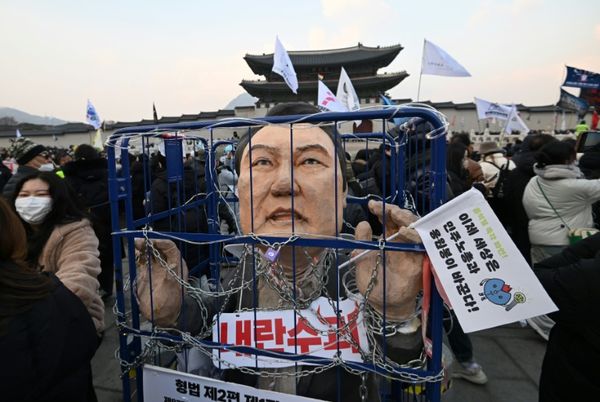
Paris (AFP) - French railway workers and civil servants voted Thursday to join striking oil refinery staff with a walkout next week, raising fears that anger over the rising cost of living could spiral into a series of blockages.
Railway staff and civil servants represented by the hard-left CGT union, the biggest in the public sector, will stop work next Tuesday, with several labour groups calling for a national day of stoppages.
The famously militant CGT said it was pushing for higher wages for railway workers but also wanted to protest government efforts to break a strike by refinery workers that has caused nationwide fuel shortages.
"Railway workers want to press again for salary improvements and denounce the repression and attack against the right to strike," said a union statement.
The government has resorted to emergency powers to compel some striking refinery workers to return to their jobs to release fuel stocks stuck inside blockaded facilities.
Six out of seven refineries have been affected by strikes that are now in their third week, causing huge tailbacks outside petrol stations and growing frustration among motorists.
"The time for a confrontation (with the government) has arrived," left-wing opposition parliamentarian Clementine Autain from the France Unbowed party told France 2 television on Thursday.
A leading Greens lawmaker, Sandrine Rousseau, said Wednesday she hoped the refinery standoff would be "the spark that begins a general strike".
Not all unions have joined the call for strikes next Tuesday, however, with the country's biggest, the CFDT, opting out.
Left-wing political parties are to hold a protest rally against the policies of President Emmanuel Macron and the rising cost of living on Sunday.
Sympathy and anger
Until Tuesday, the government had been reluctant to inflame the pay dispute at French energy group TotalEnergies and US giant Esso-ExxonMobil whose refineries are affected.
TotalEnergies made a net profit of $5.7 billion in the April-June period and is distributing billions to shareholders, sparking some sympathy for employees pushing for higher wages.
But with 30 percent of French service stations with little or no fuel, particularly those in the Paris region and the north, the government has begun requisitioning some fuel depot workers, forcing them to return to work or risk prosecution.
After an ExxonMobil depot Wednesday, a TotalEnergies site in northern France was requisitioned Thursday, with the first laden fuel tankers protected by police seen leaving during the afternoon.
Prime Minister Elisabeth Borne's office said the emergency measures were justified because of a "real economic threat" for northern France, which relies heavily on agriculture, fishing and industry.
But the unions have reacted furiously to the government intervention.
"What we are seeing here is the Macronian dictatorship," CGT official Benjamin Tange told AFP.The current industrial action, he said, arose out of "the anger of several months, several years and a rupture of social dialogue".
Striking workers at an Esso-ExxonMobil refinery in Fos-sur-Mer, outside Marseille in the south, voted Thursday to lift their blockade after reaching a pay deal with management.
That leaves five out of seven of France's refineries still affected by industrial action.
TotalEnergies announced it would hold talks with trade union representatives for the first time since the start of the strikes, raising hopes of a breakthrough.
The group has proposed a six percent raise for next year, below the CGT's demand for an immediate 10 percent hike, retroactive to January 1.
The company has come under increasing pressure from the government to reach an agreement.
Finance Minister Bruno Le Maire told RTL radio that given its huge profits this year, it had "the capacity...and therefore an obligation" to raise workers' pay.







